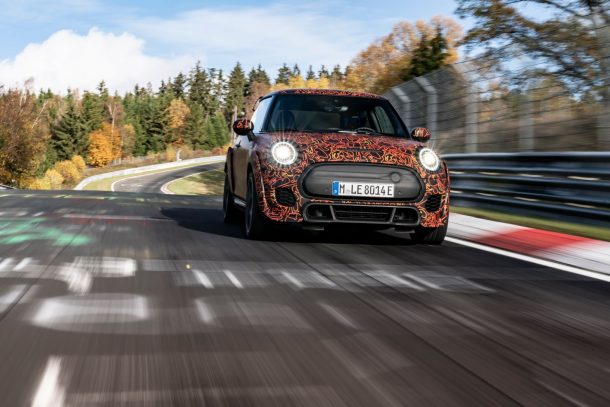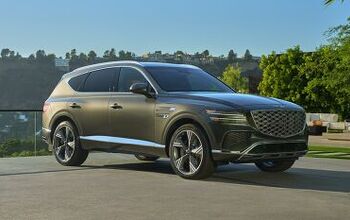John Cooper Works Mini EV or the Evolution of Small Appliances?
John Cooper Works Mini and electrification, do they go together? Do buyers who pay a premium for the JCW brand want or need an electric version?
Does the evolution of the Mini model range and parent corporation BMW’s ongoing expansion of electric mobility offer anything new for enthusiasts and loyal owners of the John Cooper Works brand? Driving enjoyment being the raison d’être for JCW, does this mean that extreme performance and genuine driving enjoyment will be available with electric drive as well as combustion engines? Will this open up new possibilities for future Mini vehicle architecture?
If you ask Mini, they’ll tell you all about what they’ve accomplished in electric mobility. They referenced the Mini Cooper SE Countryman ALL4 plug-in hybrid’s miserly combined fuel and power consumption, as the rationale that led to electrification of 5 percent of the brand. With the launch of the all-electric Mini Cooper SE, 10 percent of all Minis were now plug-ins. Based on just 10 percent and not considering the 90 percent still gas-powered, Mini said in a press release that they are preparing to press on in the development of John Cooper Works EV models.
“With the Mini Electric, we’ve shown how well brand-typical driving enjoyment and electric mobility can be combined,” said Bernd Körber, head of the Mini brand. “Now it’s time to translate the passion for performance of the John Cooper Works brand to electromobility. That’s why we’re working to develop concepts for electric John Cooper Works models.”
The current focus on the development of a Mini John Cooper Works EV demonstrates just how important electric mobility is in terms of BMW’s future direction, a goal of sustainability, if not performance and passion.
“John Cooper Works models with conventional combustion engines will still continue to have an important role to play, to make sure we’re addressing the wishes and needs of performance enthusiasts all around the world,” said Bernd Körber. “With this new focus on electric performance, we’re also creating the opportunity to sharpen the distinctive profile of the John Cooper Works brand more than ever before.”
Battery-powered tools and appliances being what they are, I’ll keep my corded DeWalt drill and rotary saw. It’s frustrating having to wait for cordless tools to power up again. I wonder if John Cooper Works EV owners will feel the same?
[ Images: Mini]
With a father who owned a dealership, I literally grew up in the business. After college, I worked for GM, Nissan and Mazda, writing articles for automotive enthusiast magazines as a side gig. I discovered you could make a living selling ad space at Four Wheeler magazine, before I moved on to selling TV for the National Hot Rod Association. After that, I started Roadhouse, a marketing, advertising and PR firm dedicated to the automotive, outdoor/apparel, and entertainment industries. Through the years, I continued writing, shooting, and editing. It keep things interesting.
More by Jason R. Sakurai
Latest Car Reviews
Read moreLatest Product Reviews
Read moreRecent Comments
- MaintenanceCosts If I were shopping in this segment it would be for one of two reasons, each of which would drive a specific answer.Door 1: I all of a sudden have both a megacommute and a big salary cut and need to absolutely minimize TCO. Answer: base Corolla Hybrid. (Although in this scenario the cheapest thing would probably be to keep our already-paid-for Bolt and somehow live with one car.)Door 2: I need to use my toy car to commute, because we move somewhere where I can't do it on the bike, and don't want to rely on an old BMW every morning or pay the ensuing maintenance costs™. Answer: Civic Si. (Although if this scenario really happened to me it would probably be an up-trimmed Civic Si, aka a base manual Acura Integra.)
- El scotto Mobile homes are built using a great deal of industrial grade glues. As a former trailer-lord I know they can out gas for years. Mobile homes and leased Kias/Sentras may be responsible for some of the responses in here.
- El scotto Bah to all the worrywarts. A perfect used car for a young lady living near the ocean. "Atlantic Avenue" and "twisty's" are rarely used in the same sentence. Better than the Jeep she really wants.
- 3-On-The-Tree I’ll take a naturally aspirated car because turbos are potential maintenance headaches. Expensive to fix and extra wear, heat, pressure on the engine. Currently have a 2010 Corolla and it is easy to work on, just changed the alternator an it didn’t require any special tools an lots of room.
- El scotto Corolla for its third-world reliability.







































Comments
Join the conversation
In the US market, Mini's sales have been shrinking for 5 years straight, and its market share is less that half its already 'mini' size of 2012. The brand is dying, and all the marketing buzzwords in the world won't save it. Problem #1: The brand name - change it. Problem #2: In keeping with the brand name, making a large Mini that people might actually want is an oxymoron. Problem #3: Because Minis are small by definition, they are quite limited in terms of EV capacity. An electric Mini might be quick, but it will suffer from class-lagging short range and will be much heavier and more costly. Critics will hate it. **** "Battery-powered tools and appliances being what they are, I’ll keep my corded DeWalt drill and rotary saw. It’s frustrating having to wait for cordless tools to power up again." That's a cheap comment from the 2010-era, as is the headline to this story. EVs and cordless tools don't have much in common, and the obvious solution to battery filling on cordless tools is to have a second battery. That works very well on my battery-powered drills, leaf blower, impact wrench, power ratchet, tire filler, and snow blower, but in typical use they don't even need a change.